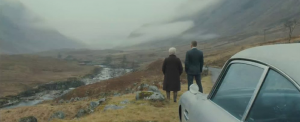 The decision awaiting Scots tomorrow will shape the rest of their lives and those of their descendants. It will also impact the rest of the United Kingdom. Leading economists completely disagree about the implications. We give a personal (and genetically Scottish) take from a systemic thinking point of view.
The decision awaiting Scots tomorrow will shape the rest of their lives and those of their descendants. It will also impact the rest of the United Kingdom. Leading economists completely disagree about the implications. We give a personal (and genetically Scottish) take from a systemic thinking point of view.
Anyone who has visited Scotland knows it’s a different country. As you cross the border, changes in landscape, accents and road quality announce that you are entering a different land. Three hundred years of union with England has done nothing to change that. Scotland has its own education, legal and fiscal systems, and a very different political bias from its English neighbours. Scots have shaped modern life as we know it. We can thank Scots for the telephone, the television and penicillin, as well as logarithms, tarmac and the pneumatic tyre.
Shall I stay or shall I go?
So what are the opposing positions and needs for this momentous Scottish independence vote tomorrow? And what is the common goal? In this blog we regularly analyze dilemmas and conflicts with the Conflict Cloud tool which allows powerful and deep analysis of assumptions and mental models governing choices.
It would seem that the conflict facing Scots is between independence versus dependence. The need that would push them towards desiring continued “dependence” is based on a desire for security. Remaining within the union could be “safer” from an economic point of view. Sharing resources within a larger entity has its benefits and might reduce risk.
On the other hand, the need prompting Scots towards the position of independence is that of developing their potential as a nation. Staying within the union may be cramping their style, economically, politically, socially and emotionally. (On a paradigmatic level, this choice is related to the conflict in our previous post, Change vs. Don’t change).
We can verbalize a common goal for these two needs of security and development as a Scotland that has a sustainable future in line with its unique attributes.
Some mental models
So, given the conflicting positions of independence and dependence, what might some of the assumptions be? We have had a shot at verbalizing a few:
- in today’s interconnected world independence is possible
- union means subjugation
- no true independence is possible without separation
- separation can only be achieved by breaking the union
- a nation cannot be fully a nation within a union
If Scots can invalidate these assumptions, then might there be an alternative to such a drastic solution? In our approach, thinking systemically, we would suggest that a way to re-examine these assumptions, especially in today’s complex reality, is to think about interdependence. Is there a different way for Scotland to interdepend successfully with the powers in London without complete separation? Could there be an attempt to increase Scotland’s ability to make decisions within the union, and a return to the decision about independence further down the road?
Rational, schmational
The problem is that this is not a situation where reason and methodical thinking can dominate. It is a choice not just for the mind but for the heart. Scots are faced with a deeply emotional choice, one that resonates with their entire history and future. They are at a crossroads, and they have the democratic right to decide. They know they have rich resources, both human and natural, and they have a vision for a fairer society that is at odds with the conservatism of David Cameron and his party.
On a personal note, my parents emigrated from Greenock and we all grew up in London. I shall never forget a trip to Scotland as a child. Shortly after crossing the border, my father stopped the car, got out to pick a sprig of heather and attached it to the car radiator. He was back in his homeland.
Scotland always has been and always will be its own nation. Whatever its decision tomorrow, we wish Scotland the bright and brilliant future it deserves.
For further discussion of systemic thinking for systemic action and relevant tools, see our new business novel+website, ‘The Human Constraint’. 2 free chapters available for download.





Leave a Reply